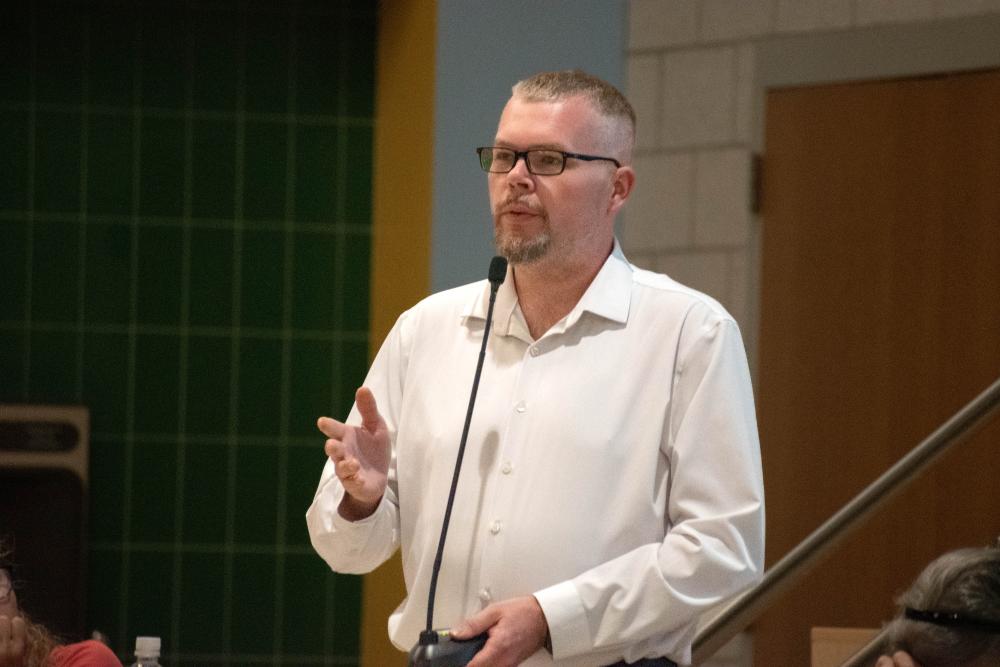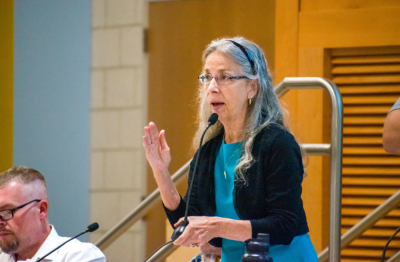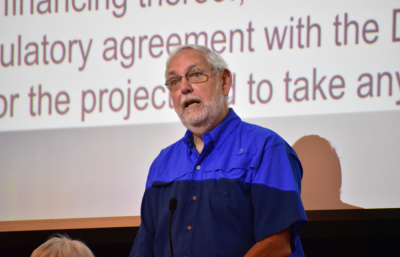Voters do not approve $36 million sewer repairs
Voters decided to turn down the $36 million sewer repairs aimed at upgrading the aging sewage treatment facility at the Special Town Meeting held Monday, July 24.
The Sewer Commission and outside consultants have argued that replacement of parts of the “headworks” and “clarifier” – dealing with sewage at the beginning and end of the treatment process are reaching the end of their useful life and that replacing them is critical to keeping the plant functioning.
This vote means the Sewer Commission’s request for borrowing authorization for this project was not approved.
Town officials and residents voiced concern about how the project would have been funded, what the future costs would have been and whether a new facility would make more sense.
In prior meetings, the Select Board voted not to recommend the borrowing authorization. The Sewer Commission, Capital Planning Committee and Finance Committee voted to recommend it.
Those in favor urged the town to take this step out of necessity for the facility’s efficiency, environmental concerns and available funds.
Finance Committee Chair Norma Scogin, speaking on behalf of the committee, said, “While this article does not address many of the complex issues the Sewer Commission needs to tackle going forward, it is intended to prevent a system failure.”
Some of these issues, including capacity concerns, are anticipated to be answered in the Wastewater Management Plan that will be drafted for the fall.
However, in the end, the project needed a two-thirds majority, which was not met, with 48 votes “Yes” and 30 votes “No.”
The plan to pay for the project, as explained by Marc Drainville of consulting at GHD, was to receive a loan from the State Revolving Fund.
Wareham’s Water Pollution Control Facility had made it onto the list of the state’s priority projects and could have qualified for approximately 10% principal forgiveness, which essentially means grant funding. There would have been zero to 2% interest on this loan.
Select Board member Alan Slavin emphasized that these loan benefits were not guaranteed and there were still several conditions the commission would have needed to meet in order to have received them.
Drainville said there would also have been an approximately 17% contribution from Bourne through an intermunicipal agreement.
However, Slavin said he spoke with one of Bourne’s Select Board members and no notification had been given of these plans.
Sewer Commission Chair Bernie Pigeon said he was waiting for approval of the borrowing authorization before taking the steps of meeting with the Bourne officials, but that this contribution is stipulated in the agreement between the two municipalities.
Drainville said with the loan, benefits and 17% contribution from Bourne, there would have been approximately $27 million that the Sewer Department would need to begin paying back when the project was completed.
This would have been covered through an $80 to $100 increase to sewer user fees.
Multiple residents highlighted that the vote included all of Wareham’s registered voters, but this project would only have an effect on the sewer users.
Peter Teitelbaum, attorney and former Select Board member, motioned to amend the article to change language that would ensure the project costs would only affect sewer users such as himself.
However, Town Counsel Richard Bowen said such changes would have affected the town’s chances of successfully receiving the state’s loan.
The motion failed in a majority vote.
Select Board member Ronald Besse said this project may cost sewer users an additional $100 now, but there is no guarantee this increase will stop or when it will stop as more repairs are needed for the sewage facility.
He discussed a new sewage treatment facility that was built in Orleans to accommodate 350,000 gallons of wastewater per day that cost almost $200 million to build.
With the kind of repairs and upgrades needed at Wareham’s facility that handles 1.5 million gallons per day, Besse said he wanted to know what that is going to cost sewer users in the future.
“Where does it stop?” he asked. “I want to know when it stops and they cannot answer that.”
Select Board Chair Judith Whiteside said, “I don't think we have all the information that we require in making an informed decision.”
Whiteside said, “When we met with the consultants, we repeatedly asked them, ‘What is the next step?’ ‘What was the total cost?’ They could not answer the question.”
She added, “I cannot recommend something when I don’t know what the total cost is and the total cost is not $36 million.”
Slavin said these needed upgrades were known about for over a decade and yet this project does not account for the needed expansion of the facility to accommodate for the economic growth of the town in years to come.
The moratorium on new sewer connections has been in place for almost three years.
A resident said he was “flabbergasted” that voters would consider going forward with a project that is not recommended by the elected Select Board and it raises a “red flag.”
“We've all been sitting back here hearing all the reasons why we have to approve this this very night, and well, the Select Board has also heard all this and is still opposing this project. So something doesn't jibe here,” he said.
Moderator Margaret Ishihara clarified the Sewer Commission is also comprised of elected officials.
Scogin said in the long term, Wareham may need a new facility, but that would take years.
She emphasized the needs of the sewage facility are immediate.
Pigeon said, “We worked very diligently. We had several reports — several reviews — to analyze the fact that this plant is not going anywhere. It's not getting any better.”
He added, “You asked what happens after this — we don't know. We've only got one plant.”
“We have no backup,” he said. “If these systems begin failing, the system itself begins failing.”


















